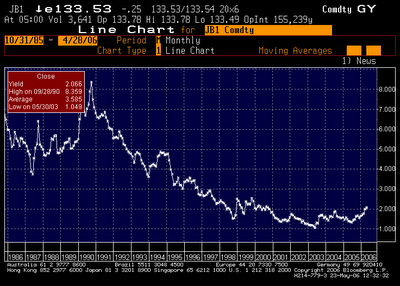 I have been an information junkie ever since I was a wee lad. I was the proud owner of a 100lb "Hallicrafters" shortwave radio set with more dials than a kid could imagine or ever want. I become so enthused with listening to the far and exotic edges of the earth (way before Hubble, Skylab, the Shuttle or the Internet) I graduated to a wonderfully sophisticated, Japanese-made Yaesu, and today still, I never travel anywhere without a small Sony to - at the very least - allow me to stay tuned to the BBC World Service.
I have been an information junkie ever since I was a wee lad. I was the proud owner of a 100lb "Hallicrafters" shortwave radio set with more dials than a kid could imagine or ever want. I become so enthused with listening to the far and exotic edges of the earth (way before Hubble, Skylab, the Shuttle or the Internet) I graduated to a wonderfully sophisticated, Japanese-made Yaesu, and today still, I never travel anywhere without a small Sony to - at the very least - allow me to stay tuned to the BBC World Service. It is important to point out (at the risk of showing my actual age) that this was during the height of the ideological cold war between the "west" and "communism". A time when people wrote and sent "letters" and still others actually answered them. "Aerogrammes" were the preferred mode of contact for boy pinching pennies. The Amerians, too, invested in radio propaganda (in the overly nasal and earnest "Voice of America"), but their efforts couldn't match the sheer weight of Soviet & Chinese efforts to persuade anyone in the english-speaking world of the inherent superiority of People's Socialism or Communism. Radio Habana Cuba, Radio Praha, Radio Moscow, Radio Kiev, Radio Bucharest, Radio Peking, and the most outrageous and hilarious of the lot, even to a twelve-year old, Radio Pyong-yang. They all were keen to share the heroic exploits of Tractor Combine Factory's #5 production triumphs, or wade into the peace-loving benefits of SS-17 Warheads vs. the evil Neutron weapons the US desired to point at the East flank of NATO. My powers bullshit detection were greatly heightened by the exercise of trying to triangulate "truth and objectivity" from the various sources of news all with differing views on the same event. Whether listening to Radio Pakistan vs. All India Radio's take on the Indo-Pakistani war, the Voice of Chile's pronouncements on the wondrous and benign regime of General Augusto Pinochet, or the Afrikaaner's hardened view on the dubious merits of Apartheid, there was rarely a dull moment when one's bullshit-o-meter could be turned off. And so I sarcastically adopted "Radio Moscow" as the metaphorical label for the obviously kitsch untruths & utter crap that one might encounter.
So what does this have to do with Japan, stock markets or the MoF? The NHK, Japan's National broadcaster, was, after all a relatively unbiased (if unprovocative) source of internatonal news and opinion. The connection is that Sadakazu Tanigaki, the Minister of Finance, is talking pure crap-ola about deflation and the impact of Yen appreciation and higher interest rates upon the Japanese economy, and he must be held accountable and internationally shamed for his persistent perversion (surely I mean sub-version??) of the truth. This has earned him my "Radio Moscow" award for this week.
For Bloomberg reported today that Chief MoFo Tanigaki (and other ministry officials) wentr on the offensive by saying that depsite six months of positive increases in prices, deflation stil, persists in Japan. "We still can't say that the economy has emerged from deflation", he said. Chief Cabinet Secretary Shinzo Abe, in pole-position for Koizumi's job, echoed this populist sentiment by saying: "Today's report [+0.6%) confirms deflation isn't over". What they are cynically, if not intentionally ignoring for Japan's marginal but parochial gain, is that international capital flows are more or less free and open. Sitcking to ZIRP when things are rather obviously booming in Japan is akin to leaving the tap open in the bath and letting the tub overflow. But because of the nature of relative interest rates, Tanigaki and the Japanese are metaphorically living on the third floor apartment, and all the liquidity is falling through a hole in the causing great damage to the flats below. And when we yell upstairs "HEY! W.T.F.??!!", we get Tanigaki, Abe and friends of MoF & LDP doing their Radio Moscow imitation "...leak? What leak....?"



